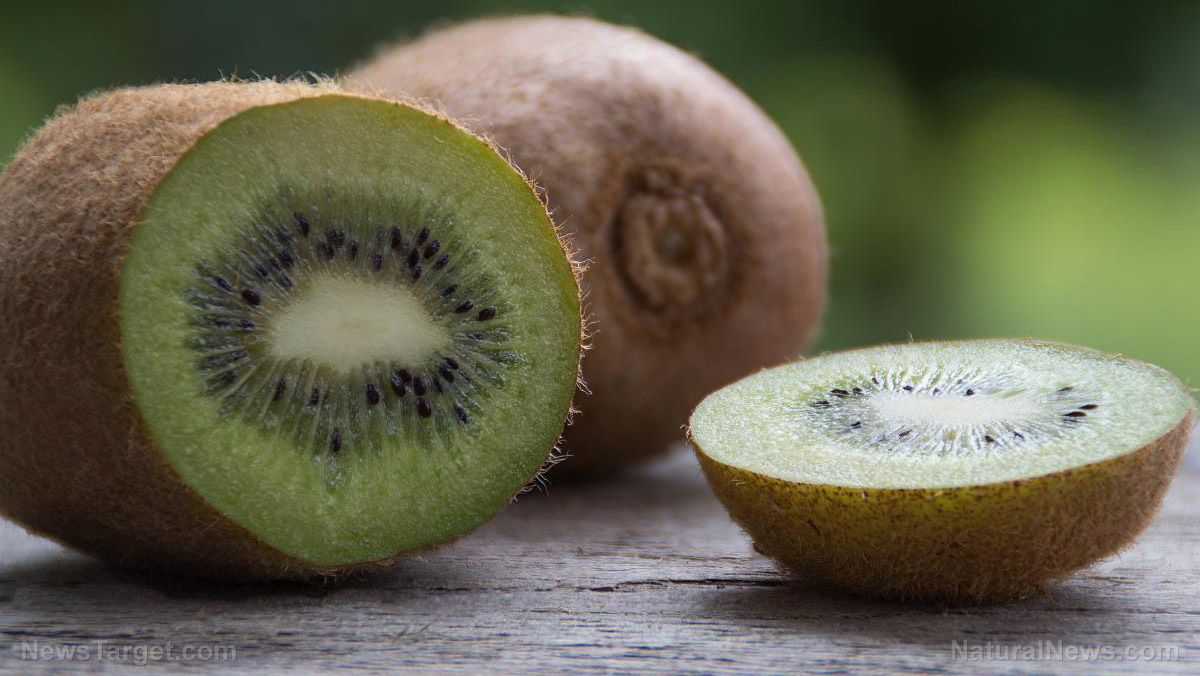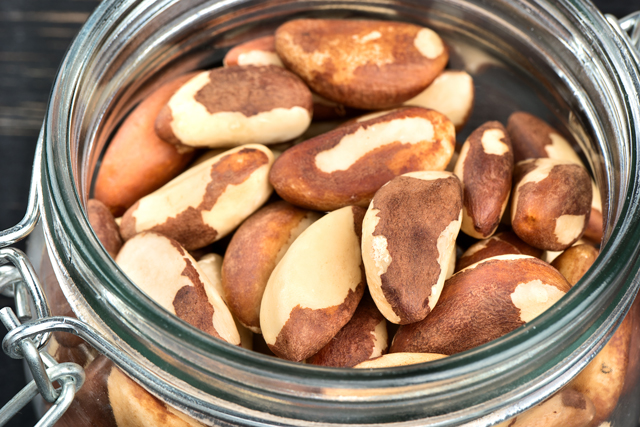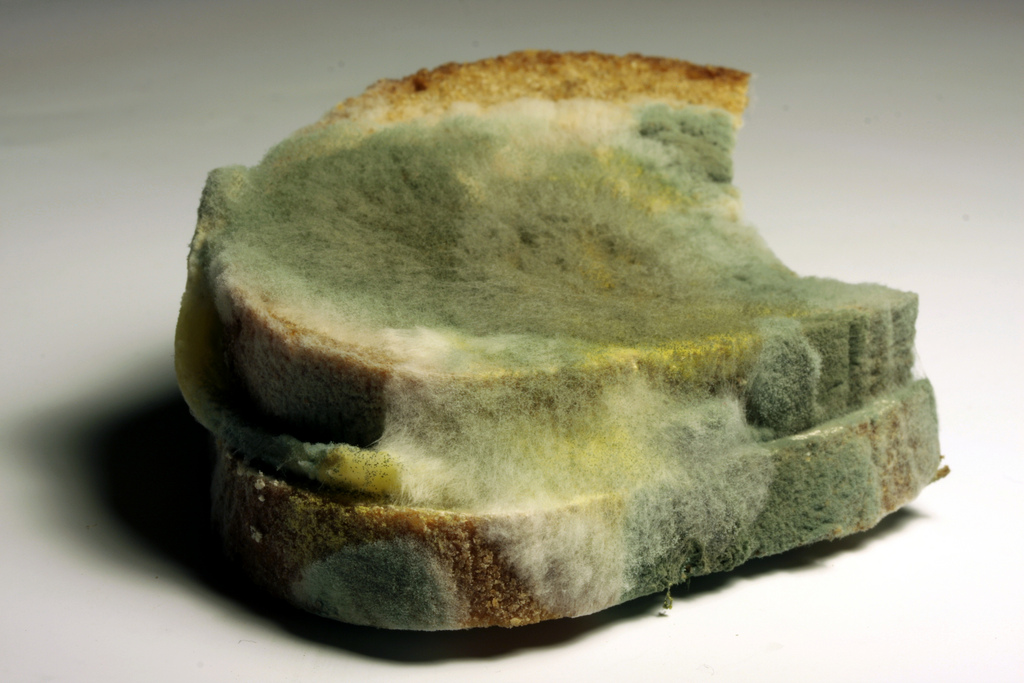Kiwi: A tangy superfood packed with nutrients and health benefits
06/10/2025 / By Laura Harris

- Kiwi originated in China (as “Chinese gooseberry”) but was popularized by New Zealand, which renamed it after its national bird. Now grown globally, it’s available year-round.
- Packed with vitamins C, E, K, folate, potassium, fiber and antioxidants, kiwi can support immunity, heart health, digestion, skin vitality and good-quality sleep.
- Kiwi fruit also aids digestion and helps reduce inflammation and oxidative stress. It’s a low-calorie, high-fiber fruit that supports weight management.
- Though pesticide risk is low, choosing organic kiwi minimizes residues like chlorpyrifos. People prone to kidney stones should be mindful of kiwi’s high oxalate content.
- Enjoy kiwi fresh, blended in smoothies, tossed in salads, mixed into salsas or desserts, or juiced. Pair it with yogurt, avocado or tropical flavors for creative dishes.
In the world of superfoods, few fruits are as vibrant, nutrient-dense and versatile as the kiwi fruit. With its bright green flesh, tiny black seeds and tangy-sweet flavor, kiwi is not only a delight to the palate but also a powerhouse of essential vitamins, minerals and antioxidants. Originally native to China, this fuzzy-skinned fruit has traveled the globe, earning its place in modern wellness and culinary traditions.
But what makes kiwi so special? Beyond its refreshing taste, kiwi offers a wealth of health benefits – from aiding digestion to boosting immunity. This article will explore the history, nutritional profile, potential concerns (such as pesticides) and delicious ways to incorporate kiwi into your diet.
Brief history of kiwi
The kiwi fruit, scientifically known as Actinidia deliciosa, is a small, oval fruit with a fuzzy brown exterior and vibrant green or golden flesh dotted with tiny edible black seeds. While many associate kiwi with New Zealand (where it was commercially popularized), its origins trace back to China, where it was known as the Chinese gooseberry.
The kiwi fruit was first cultivated in the Yangtze River Valley in ancient China and valued for its use in traditional medicine. In the early 20th century, missionaries introduced kiwi seeds to New Zealand, where local farmers began cultivating the fruit. By the 1950s and 60s, New Zealand rebranded it as “kiwi,” inspired by its national bird, and started exporting it worldwide.
Today, kiwi is grown in numerous countries, including Italy, Chile and the U.S., ensuring its availability year-round as a globally enjoyed fruit.
Nutritional profile and health benefits
Kiwi is one of the most nutrient-dense fruits, offering a remarkable blend of vitamins, minerals and bioactive compounds. Here’s a breakdown of its key nutrients per 100 grams (g), or about one medium-sized kiwi:
- 93 milligrams (mg) of vitamin C, which supports immunity and skin health
- 40.3 micrograms (mcg) of vitamin K, an essential nutrient for blood clotting and bone health
- 1.5 mg of vitamin E, a potent antioxidant for skin and cellular health
- 25 mcg of folate, which is crucial for DNA synthesis and pregnancy health
- 312 mg of potassium, which helps regulate blood pressure and muscle function
- 3 g of dietary fiber, which supports digestion and gut health
- Antioxidants like flavonoids and carotenoids that combat oxidative stress and inflammation
Kiwi offers numerous health benefits, from enhancing immunity and digestion to supporting heart health and improving skin vitality. Whether you’re looking to reduce inflammation, sleep better or maintain a healthy weight, this tangy green fruit delivers impressive nutritional perks with every bite. (Related: 8 Ways kiwi fruits keep you healthy.)
Here are kiwi’s impressive health benefits, according to studies:
Boosts immunity
Its high vitamin C content helps strengthen the immune system by enhancing white blood cell function and protecting against infections.
Aids digestion
The enzyme actinidin in kiwi helps break down proteins, improving digestion and reducing bloating.
Supports heart health
Potassium in kiwi helps regulate blood pressure, while fiber helps lower cholesterol, reducing cardiovascular risks.
Enhances skin health
Kiwi’s vitamins C and E promote collagen synthesis, improving skin elasticity and reducing signs of aging.
Improves sleep
Kiwi contains serotonin, which may help regulate sleep cycles and improve sleep quality.
Anti-inflammatory effects
Antioxidants like flavonoids and carotenoids help reduce chronic inflammation linked to diseases.
Supports weight management
Low in calories (42 kcal per serving) but high in fiber, kiwi promotes satiety and healthy digestion.
Considerations
Kiwi is generally safe to eat and highly nutritious, but conventional farming practices may involve pesticide use.
While the Environmental Working Group (EWG) classifies kiwi as a low-risk fruit for pesticide residues, some concerns remain. Common pesticides found in non-organic kiwi include chlorpyrifos (banned in some countries but still used elsewhere), thiabendazole (a fungicide) and imazalil (another fungicide). Heavy metal contamination is not typically associated with kiwi, though soil quality plays a role in overall safety.
Opting for organic kiwi can help reduce exposure to synthetic chemicals. While the fruit’s thick skin provides some protection against pesticides, choosing organic is preferable to minimize intake. If organic options are unavailable, thorough washing can help reduce residues.
Additionally, kiwis contain high levels of oxalates, which may worsen conditions like calcium oxalate kidney stones in sensitive individuals. For serving ideas, enjoy kiwi whole, in fruit salads or juiced for a refreshing drink. As with other produce like mangoes and lemons, which often carry pesticide residues, selecting organic when possible is advisable to mitigate potential risks.
Culinary uses of kiwi
Kiwi’s sweet-tart flavor and soft texture make it a versatile ingredient in both sweet and savory dishes. Here are some delicious ways to enjoy kiwi:
Breakfast and smoothies
- Kiwi smoothie bowl – Blend with banana, spinach and almond milk
- Overnight oats – Top with sliced kiwi, chia seeds and yogurt
Salads and savory dishes
- Tropical salsa – Combine kiwi, mango, jalapeño and lime for a fresh dip
- Kiwi and avocado salad – Mix with greens, nuts and a citrus vinaigrette
Desserts
- Kiwi sorbet – Blend frozen kiwi with honey and lime juice
- Fruit tart – Use kiwi slices as a colorful topping
Beverages
- Kiwi mojito – Muddle kiwi with mint, lime and soda water
- Green detox juice – Juice kiwi with cucumber, apple and ginger
Kiwi is more than just a tasty fruit — it’s a nutritional powerhouse that supports digestion, immunity, heart health and glowing skin. Whether you enjoy it fresh, blended or as part of a gourmet dish, this vibrant fruit is a delicious way to boost your wellness naturally.
This story is not medical advice and is not intended to treat or cure any disease. Always consult with a qualified naturopathic physician for personalized advice about your specific health situation or concern.
Visit NaturalNews.com, a great article source where you can learn about superfoods and their health benefits.
You can also try Brighteon.ai, an AI model created by Mike Adams, also known as the Health Ranger. This model is available as a free download to be run locally and is designed to help share and decentralize knowledge. By doing so, it aims to bypass censorship and empower people with knowledge.
If you’re looking for an uncensored video free speech website where you can openly discuss nutrition, natural medicine, ingredients and more, check out Brighteon.com and our two free speech social media sites, Brighteon.IO and Brighteon.social.
Watch this video to learn about eight surprising health benefits of eating kiwi.
This video is from the Natural News channel on Brighteon.com.
More related stories:
8 Science-backed health benefits of eating kiwi.
Exotic superfruit: Considering the health benefits of kiwi.
Reduce your heart disease risk with kiwi: Research.
Sources include:
Submit a correction >>
Tagged Under:
#nutrition, food cures, food is medicine, food science, Fresh, fruits, functional food, grocery cures, health science, ingredients, Kiwi, natural health, nutrients, organics
This article may contain statements that reflect the opinion of the author





















